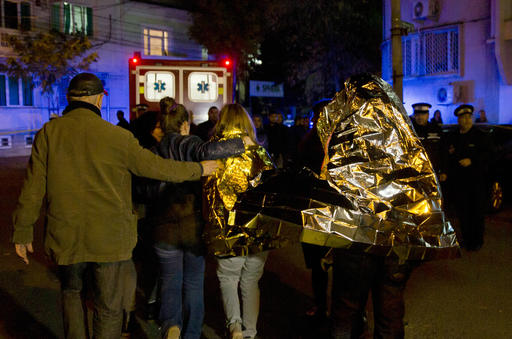BUCHAREST, Romania (AP) — A year ago, Miluta Flueras was taking photos of a rock band at the Colectiv nightclub when he was trapped in a fire that killed 64, the worst in Romania’s modern history.
Flueras dragged himself out of the inferno, which was sparked by a pyrotechnics show, and spent the next 42 days in a Bucharest hospital undergoing two operations. He still wears a cap after the fire seared his curly mop of hair and scalp, and compression gloves protect his charred hands while he awaits skin grafts.
But he considers himself one of the lucky ones.
“I didn’t hear the horror, the screams,” because I got out early, he said in a recent interview with The Associated Press. “Some (survivors) cut themselves off from others. Others suffered a lot.”
On Sunday, around 5,000 Romanians marched silently through the capital to honor the dead. Concerts are scheduled for the evening and another march where some will renew demands for greater accountability and respect for public health standards. Clubs have been asked to beam a ray light into the sky at 10:32 p.m. — the time the fire started.
A religious service held near the club. The influential Orthodox Church was criticized for not offering comfort in the days after the deflagration and has since tried to reach out to non-churchgoers.
The inferno on Oct. 30, 2015, raged for 153 seconds, and reached a temperature of 800 C (1,470 F), melting clothes and flesh and spewing white-hot toxic gases. Some victims managed to stagger or crawl outside only to die on the road outside. Others flagged down cabs or passing cars to take them to hospitals.
The youngest victim was a 15-year-old high school pupil, while in March, almost six months after the fire, marketing student Radu Sienerth, 22, succumbed to his injuries becoming the 64th victim.
The club’s cleaner, a single mother of five children, also died, as did four of the five members of Goodbye to Gravity rock band. Photographers, architects, young professionals, students and graphic artists also died.
After the fire, first there were tears and days of mourning, which then exploded into anger. Up to 30,000 Romanians protested, demanding an end to widespread corruption which many said resulted in lax safety standards that allowed the fire to break out. The government collapsed and amid a murderous public mood against politicians, a government of technocrats was installed.
After the tragedy, clubs around the country closed down, and others put in place rigorous safety standards, though corruption and poor safety standards haven’t been eradicated. Parliament approved a strict public smoking ban.
Flueras, a 32-year-old cartographer who takes photos of rock bands, points out that survivors are waiting for the trial of the three club owners who were indicted on manslaughter charges and two others who staged the firework show that sparked the fire.
“Unfortunately, there is no precedent and things haven’t moved quickly … the trial hasn’t begun and we are in a preliminary phase,” he said.
On the night of the fire, about 400 people were dancing to the music of Goodbye to Gravity, which was promoting its new album, “Mantras of War,” when a spark from the band’s pyrotechnics show ignited the foam ceiling, erupting into flames, sending panicked revelers stampeding for the single-door exit.
As news spread, parents arrived at the scene, some kissing ambulances taking their children to hospital. The initial death toll was 26. Romanian hospitals, ill-equipped to cope with the biggest disaster since the 1989 revolution, sent victims abroad for treatment in the following days and weeks. Thousands in Romania and neighboring Moldova donated blood to help the victims.
Flueras tries to dwell on the positive aspects such as new friendships sustained by a social media Colectiv survivors’ group, where some are more reluctant to talk publicly than him, or whose injuries are life-changing such as amputated fingers.
“I think about it quite often. You can’t not remember it. But it depends on how you react and what memories and traumas you have,” he said. “People often ask me whether I have black gloves for camouflage, but when they find out, they are sorry they joked about it.”
Copyright 2024 The Associated Press. All rights reserved. This material may not be published, broadcast, rewritten or redistributed.

